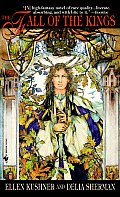
| Series: | Riverside #2 |
| Publisher: | Bantam |
| Copyright: | November 2002 |
| Printing: | October 2003 |
| ISBN: | 0-553-58594-0 |
| Format: | Mass market |
| Pages: | 508 |
The Fall of the Kings is an indirect sequel to Kushner's earlier book, Swordspoint. It's set sixty years later, during which Riverside has undergone a transformation similar to that of several neighborhoods of American cities: it's gone from dangerous to somewhat hip, slum to abode of starving artists. Katherine has inherited the House of Tremontaine from the now-deceased Mad Duke. His wife Sophia teaches surgery. And her son, Theron Campion, switches from discipline to discipline at the University, partying and getting caught up in ill-advised love affairs, playing the social game of nobility and trying to avoid the scandals his personality leads him towards.
Basil St Cloud also lectures at the University, but in ancient history. His particular speciality is ancient kings, particularly the time of the union of the North and South when the northern kings had wizards as their companions. Magic doesn't exist, of course. The wizards were frauds and charlatans, evil men who used their influence to rule the kingdom through their puppet kings, until the nobles (who still rule) deposed them both, outlawed magic, and put an end to the monarchy. All this is accepted history, set down by the master historians of the past, and other historians debate the fine points of their words. Basil doesn't put as much stock in those historians, frequently beholden to the nobles who declared their work official, and instead prefers original sources. And what he finds in those original sources leads him and his students toward theories and investigations that make the nobles of the city very wary.
This is the political background for a novel about scholarship, magic, nobles and students, and debates over research methodology. The academic setting, with its student-paid teachers, rivalries between student groups, and echoes of medieval universities, easily caught my attention. The interactions of the nobles are less interesting, but they have some of the twistiness of Swordspoint and the supporting cast help. I particularly liked the contrast between the noble parties Theron escorts his mother to, the academic life he and his mother retreat into in different ways, the prosaic life of his other relatives, and the way Lady Katherine pivots between all of them.
Unfortunately, none of this is the main plot driver. Instead, the story increasingly focuses on the relationship between Basil and Theron, quickly becoming sexual, and the worlds of magic and mythic kings that becomes deeply entangled in their love affair. There's a lovely, ornate background, but the center of the book is love and lust, literal and in numerous symbolic guises, and it spills into every corner. By the middle of the book, even the villains seem as interested in their sexual desires as their political power. There's a depressing amount of sexual soap opera and dramatic passion.
This isn't badly written. In fact, if gay male erotica did anything for me, I expect I'd find it quite interesting. (Not that it's ever explicit, but there's plenty of tastefully-described sex, naked male bodies, long hair, kneeling, fondling, and so forth.) It's not my style of erotica, however, which meant increasingly frustration and annoyance as the to-me interesting parts of the book were pushed aside by the parts I found boring. The magic and its sexual undercurrent slowly overwhelms everything else, turns both Basil and Theron into thoroughly unlikeable characters (for different reasons), and swamps what I thought was a promising conflict between ideas of scholarship. It's all very disappointing.
There are some bright spots, but they're mostly in the supporting characters. My favorite character in the book only appears in the last hundred pages, but she does a great deal to salvage the entire book. Sophia and Katherine are interesting throughout, as are the dynamics of Basil's core students. I found Justis — stolid, reliable Justis, who joins Basil's class near the start of the book and serves as an anchor for the University perspective throughout — more sympathetic than the characters that dominated the stage. Kushner and Sherman are good at characterization and take the time to construct complex characters. Even the ones I sloppily declared villains have lives, motives, and facets of their own that felt satisfyingly real.
Unfortunately for my enjoyment, the center of the book is Basil and Theron, and while I liked both of them separately at the start, together I found them tedious. Worse, over the course of the story, Basil turns from a sympathetic character into someone who I didn't care about and didn't want to read about. There are enough other worthwhile characters to avoid the eight deadly words ("I don't care what happens to these people"), but they are alas entirely true of Basil for me. That mars even a tense, dramatic, and well-executed conclusion.
If you find pretty men erotic, or at least find more interest in gay love affairs than I, you will probably like this book much better than I did, but I fear you'll still be disappointed in Basil. Swordspoint is a marvel; The Fall of the Kings isn't at the same level. It's almost worth reading just for the background, but the characters and the overwhelming but not engaging magic bothered me a bit too much to recommend it.
Reviewed: 2008-11-11